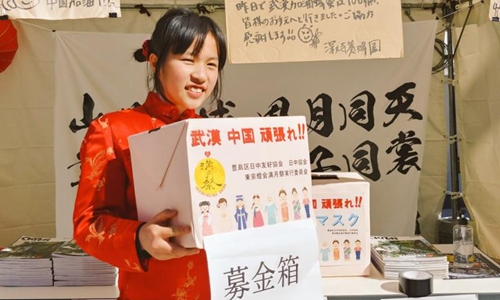HOME >> OPINION
People-to-people exchanges strengthen global mutual trust
By Shi Tian Source:Global Times Published: 2020/2/12 21:22:37

A 14-year-old Japanese girl raises donations for Wuhan, capital of Central China's Hubei Province and epicenter of outbreak of the novel coronavirus, on Saturday in Tokyo, Japan. She did the same on Sunday. Photo: Courtesy of the Executive Committee of the Tokyo Lantern Full Moon Festival Ikebukuro 2020
When the novel coronavirus pneumonia is defeated, many Chinese, whose travel is limited during the epidemic period, might brook no delay to take a trip. And perhaps some of them will choose Japan as their first outbound destination, because they may be eager to express their thanks in person to a Japanese girl.
To raise donations for Wuhan, the outbreak's epicenter in Central China, a 14-year-old Japanese girl wore a Chinese-styled cheongsam and kept bowing low to passers-by at a lantern festival in Tokyo on Saturday and Sunday. The video clip of her move has been widely watched on Chinese social media platforms, touching the hearts of thousands of Chinese people.
Like this girl, quite a few individuals and non-governmental organizations in Japan provided China with much-needed supplies.
In this regard, the epidemic has provided us a rare opportunity to observe the vitality of people-to-people exchanges between China and the world.
Over the past years, China has witnessed profound changes in people-to-people exchanges with other countries, especially among the younger generation.
With the dramatic increase in outbound tourism and other forms of communications, Chinese people's understanding of the outside world has become much wider and deeper. Meanwhile, a growing number of foreigners, in particular from our neighbors such as Japan, South Korea and Southeast Asian countries, are visiting and working in China.
More exchanges might bring more conflicts, as people in different countries always hold different views. And some historical problems may also crop up, provoking national sentiment. But one thing is certain: In the era of globalization, countries will inevitably get closer. We need to learn how to get along with long-existing problems if we cannot solve them easily and quickly.
The key to improving people-to-people exchanges is to communicate in an all-round way and by various means. By doing so, different countries can deepen mutual understanding and prevent historical issues from hindering exchanges.
In particular, in dealing with certain issues that may cause fierce opposition among peoples, we should be extremely cautious. We should in no way let a few people dominate our overall perception of a country and our overall exchanges with it.
In this process, media's role is essential. Each country's mainstream media should pay more attention to those positive exchanges and to the cultural phenomena that can resonate with the people, so as to further strengthen mutual trust through exchanges and promote a better understanding of historical issues.
For example, many ordinary Chinese have a positive impression of Japan. Many Japanese novels are best-sellers in Chinese bookstores, and Japanese shows, anime, TV series and celebrities are popular among young Chinese.
However, both countries' officials, mainstream media outlets and scholars are putting too much emphasis on the political, economic, and diplomatic issues.
It is true that these issues are important, but cultural and people-to-people exchanges are equally significant. For instance, it is important for both the Chinese government and people to appreciate and reciprocate Japanese people's kindness amid this epidemic.
Neglecting people-to-people exchanges exists not only between China and Japan, but also in the entire East Asia, and even outside the continent.
Take China-US relations. Regardless of various conflicts between China and the US as well as the US administration's disappointing behavior amid the coronavirus outbreak, individuals and non-governmental organizations in the US have provided China with assistance and have shown us the potential of bilateral people-to-people exchanges.
People from all over the world share a common future. Understanding the significance of people-to-people exchanges is conducive to a country's standing and development in the international community.
Posted in: OBSERVER